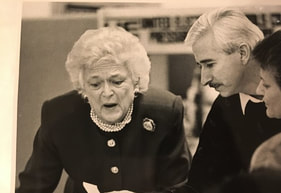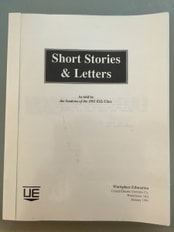
In 1987, my company, United Electric (UE) initiated an ESL training program to support our continuous improvement efforts. The idea came from a factory supervisor who noted, “If we really want to create a continuous improvement culture we need to give our employees an opportunity to read and speak English.” Over nine languages were spoken in the plant and while many employees understood enough English to get by, few spoke or read English well enough to get ahead. In order to discuss problems and share ideas, it was essential for UE to invest in ESL learning for its employees.
With funding from the Massachusetts Workplace Education Initiative and under the guidance of a gifted ESL teacher, UE’s HR department established an ESL curriculum that was astounding in its impact. Employees attended classes during the workday and curriculum was thoughtfully constructed to support their particular jobs. Ironically, as UE adopted concepts from TPS over the next several years, Japanese words were added to ESL student’s lessons. Employees were learning English, but also Japanese words like Kanban and Poka-Yoke, concepts that now were part of their second language. The difference in the work environment was notable almost immediately. Persons who might have previously been considered “difficult” were actually just frustrated at being unable to describe the problems they faced in their work. ESL had opened the lines of communication, changed attitudes and unlocked creativity. What had been a virtual Tower of Babel was developing as a rich multi-cultural team. The proof of the transformation showed in UE’s 1990 award of the Shingo Prize, heralding its excellence in quality, productivity and customer service. While this was truly an honor, perhaps a more meaningful recognition was yet to be bestowed.
On January 28, 1991 in midst of the first Gulf War, another war was being waged by then First Lady Barbara Bush. At the invitation of the Massachusetts Commonwealth Literacy Campaign, Mrs. Bush visited UE to celebrate with ESL students from our 1991 class and promote the critical importance of adult literacy. The day was extraordinary on many levels. First, due to the Gulf war, security was extremely tight. Parking was cordoned off for two blocks around building and bomb-sniffing dogs scanned the factory and offices. Because we were advised only a few days earlier that our site would receive a visit from Mrs. Bush, cleanup activity in the plant was frenetic. Workplace organization, which was normally very good, achieved new heights. Halls were given a fresh coat of paint and floors were buffed. Even the elevator, which was normally used only for freight, was painted red, white and blue. We were honored that the First Lady and number one advocate of adult literacy would visit our site.

Shortly before 2:00 p.m., as an armada of state and local police cars could be seen in the distance escorting the First Lady’s party, the excitement was palpable. After formal greetings in the lobby with management, Mrs. Bush proceeded to our ESL classroom to attend a class and meet with students. In preparation, each student had written a short story or letter to Mrs. Bush, and ESL compiled these into a booklet entitled “Short Stories and Letters,” a tangible memento and testimony to the power of ESL. A letter from one of the students, a gentleman who emigrated from Aleppo, Syria summed up the sentiments of the class:
“When I first came to America, I felt stupid because someone talked and I looked at their faces and never did I understand. It is important to have ESL in the workplace because now I can understand the blueprints and the order papers. I understand what my supervisor says. I am starting to read the newspapers and write my own checks. I can take care of my family shopping and my home. This month, for the first time, I wrote down two valued ideas to save the company money.”
Following the ESL class, Mrs. Bush accompanied students to the Gemba where students proudly demonstrated some of the many improvements they had made to their work. I am absolutely sure that none of these stories would ever have been told without the investment made in our employees to learn English as a second language. Having the opportunity to offer this testimony directly to the First Lady of Adult Literacy was a powerful moment.
After Gemba, Mrs. Bush and an entourage of secret service, political dignitaries and labor leaders boarded the red-white-and-blue elevator to attend a meeting in the cafeteria for speeches and photo ops. I was asked to provide a short speech of no more than five minutes about the value of ESL and its impact on our company and our employees. I recall that this was the one and only time in my career that I wrote a speech down, memorized it and presented it verbatim – exactly five minutes in length. Several other five-minute speeches followed including one from our Governor Bill Weld.
Finally, the great lady spoke, culminating the eventful day. She spoke first of the importance of literacy to our country and our families, relating the goals of her literacy foundation. Mrs. Bush then addressed the ESL students, thanking them for their diligence and applauding their efforts. She then turned to Mr. Weld, quipping “perhaps the State of Massachusetts could learn something about continuous improvement and problem solving from these students.” The room erupted with laughter as the Governor nodded in agreement. After a short reception, the magic day was over and we all got back to work, grateful to have had the First Lady of Literacy in our midst.
Thank you, Barbara Bush.
O.L.D.

